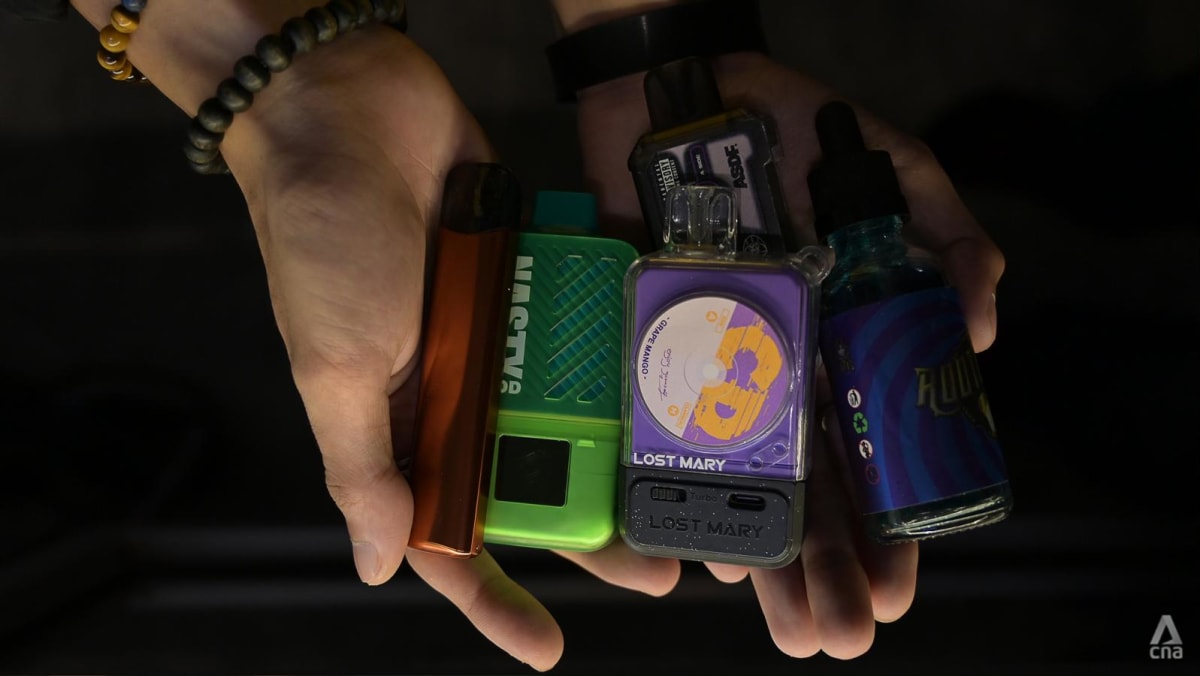Adj Assoc Prof Puah, who also leads the National Healthcare Group’s Respiratory Health Steering Committee Smoking Cessation Workgroup, said that it is still early to be certain about the effects of the long-term use of etomidate, but what they are seeing now is “already worrying”.
Even without etomidate, vapes and nicotine can stunt brain growth and cause attention issues.
“You add etomidate to that, you add all sorts of illegal substances to these pods, you can imagine that the effects are double, triple, even 10 times,” he added.
“Why do we want to wait till we have information and act when it’s too late?”
Giving an example of another negative effect, Asst Prof Sewa said that the prolonged use of etomidate can suppress the vape user’s ability to produce hormones essential in preventing low blood pressure or low sugar count.
“It can lead to an adrenal crisis, where the patient may go into seizures or even coma,” he warned, adding that there have been reports of such cases in patients who have abused the drug for a long time and in large doses.
How can one overcome addiction to etomidate?
Dr Munidasa Winslow, a senior consultant psychiatrist at Promises Healthcare clinic, said that people who use etomidate should know that they can get help and recover.
“Substance use is rarely just about the drug. It is often tied to deeper emotional or psychological roots,” he said.
Users who find themselves wanting to seek help should start by talking to someone they trust. After that, they should speak to a qualified healthcare professional.
“Avoid the instinct to quit abruptly on your own,” he advised.
Etomidate is a potent sedative and its misuse can have unpredictable and potentially dangerous effects.
Depending on how often it is used, stopping suddenly might lead to withdrawal symptoms and may increase the risk of relapse.
Dr Winslow also said that recovery must be approached with a plan, for example, through therapy or a support group.
“What is more important is understanding why it became a crutch in the first place, and how to replace that with healthier, more sustainable ways to cope.”
What are other jurisdictions doing about it?
Across Asia, some governments have stepped up regulation on etomidate.
The authorities in China officially placed etomidate under control in October 2023, the Office of China National Narcotics Control Commission stated.
More recently, Hong Kong classified etomidate – known commonly as “space oil” there – under the Dangerous Drugs Ordinance in February.
Under the ordinance, anyone found in possession or consumption of the substance is subject to a maximum penalty of seven years’ jail and a fine of HK$1 million (S$163,400).
How does Singapore’s move fit with its overall approach to vaping and drug use?
Assistant Professor Yvette van der Eijk from the National University of Singapore Saw Swee Hock School of Public Health said that classifying etomidate as an illegal drug will give the authorities greater leverage to curb its misuse in vaping devices.
In Singapore, all offenders caught for the purchase, use and possession of vapes, or e-vaporisers, are now referred to the Health Science Authority and subject to a fine of up to S$2,000 (about US$1,560).
Etomidate is a controlled substance under the Poisons Act. However, once it is listed under the Misuse of Drugs Act, people who consume it will be treated “no differently” from those who consume hard drugs and narcotics such as cannabis and cocaine, Mr Ong said.
This means that anyone caught using etomidate will be subject to supervision, have to undergo mandatory rehabilitation and may also be committed to a drug rehabilitation centre.
Repeat offenders will be prosecuted and may be jailed for at least a year.
Asst Prof van der Eijk said: “This move not only disrupts the supply and demand for K-pods, but also reinforces Singapore’s zero-tolerance approach to emerging forms of substance abuse.”
She also said that the move will raise awareness of the significant health risks associated with drug-containing vapes.













